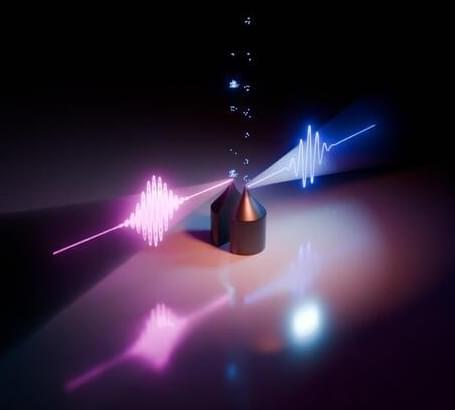There’s a new COVID variant nicknamed “FLiRT.” Here’s what you need to know about the variant, including the symptoms.






Scientists have published the most detailed data set to date on the neural connections of the brain, which was obtained from a cubic millimeter of tissue sample.
A cubic millimeter of brain tissue may not sound like much. But considering that that tiny square contains 57,000 cells, 230 millimeters of blood vessels, and 150 million synapses, all amounting to 1,400 terabytes of data, Harvard and Google researchers have just accomplished something stupendous.
Led by Jeff Lichtman, the Jeremy R. Knowles Professor of Molecular and Cellular Biology and newly appointed dean of science, the Harvard team helped create the largest 3D brain reconstruction to date, showing in vivid detail each cell and its web of connections in a piece of temporal cortex about half the size of a rice grain.
Published in Science, the study is the latest development in a nearly 10-year collaboration with scientists at Google Research, combining Lichtman’s electron microscopy imaging with AI algorithms to color-code and reconstruct the extremely complex wiring of mammal brains. The paper’s three first co-authors are former Harvard postdoc Alexander Shapson-Coe, Michał Januszewski of Google Research, and Harvard postdoc Daniel Berger.


Researchers at Istituto Italiano di Tecnologia (IIT-Italian Institute of Technology) in collaboration with the University of Freiburg have developed a biohybrid robot, which consists of a flour-based capsule created using 3D microfabrication techniques, and two natural appendages from oat fruit capable of moving in response to air humidity.

Toyota is aiming to start producing electric vehicle (EV) batteries next year at its upcoming factory in North Carolina, set to eventually build battery packs for the company’s hybrids, plugin hybrids and EVs.
After increasing its investment into the plant to $13.9 billion total last year, Toyota has continued to make progress on construction at the site since it broke ground in the latter part of 2022.
Toyota chairman predicts EVs will only reach 30 percent market share

A new, Yale-led study suggests that a range of respiratory viral infections—including COVID-19 and influenza—may be preventable or treatable with a generic antibiotic that is delivered to the nasal passageway.
A team led by Yale’s Akiko Iwasaki and former Yale researcher Charles Dela Cruz successfully tested the effectiveness of neomycin, a common antibiotic, to prevent or treat respiratory viral infections in animal models when given to the animals via the nose. The team then found that the same nasal approach—this time applying the over-the-counter ointment Neosporin—also triggers a swift immune response by interferon-stimulated genes (ISGs) in the noses of healthy humans.
The findings were published in the journal Proceedings of the National Academy of Sciences.

In what has become a familiar refrain when discussing artificial intelligence (AI)-enabled technologies, voice cloning makes possible beneficial advances in accessibility and creativity while also enabling increasingly sophisticated scams and deepfakes. To combat the potential negative impacts of voice cloning technology, the U.S. Federal Trade Commission (FTC) challenged researchers and technology experts to develop breakthrough ideas on preventing, monitoring and evaluating malicious voice cloning.
Ning Zhang, an assistant professor of computer science and engineering in the McKelvey School of Engineering at Washington University in St. Louis, was one of three winners of the FTC’s Voice Cloning Challenge announced April 8. Zhang explained his winning project, DeFake, which deploys a kind of watermarking for voice recordings. DeFake embeds carefully crafted distortions that are imperceptible to the human ear into recordings, making criminal cloning more difficult by eliminating usable voice samples.
“DeFake uses a technique of adversarial AI that was originally part of the cybercriminals’ toolbox, but now we’re using it to defend against them,” Zhang said. “Voice cloning relies on the use of pre-existing speech samples to clone a voice, which are generally collected from social media and other platforms. By perturbing the recorded audio signal just a little bit, just enough that it still sounds right to human listeners, but it’s completely different to AI, DeFake obstructs cloning by making criminally synthesized speech sound like other voices, not the intended victim.”